Advanced Material and Chemistry Field
Advanced Materials based on Chemistry and Physics
Research Contents
From the viewpoints of a sustainable and environmentally friendly society, electric vehicles and fuel cell vehicles have attracted increasing attention. The education and research of the Advanced Material and Chemistry field are related to advanced materials including inorganic, organic, polymeric and metallic substances, which contribute to high performance, weight saving and durability of the components in automobiles. The research area of this field covers lithium-ion batteries, fuel cells, rechargeable batteries, capacitors, electrical storage devices, catalysts for decomposition of automobile exhaust gas, polymer nanocomposites, filtration membranes, coatings, adhesives, solar cells, semiconductor power devices and hydrogen sensors. The above-mentioned materials designed by precious chemistry and physics should promote the development of next generation automobiles.
Eco-Friendly Future-Oriented Automobiles to be Realized by Advanced Materials and Chemistry
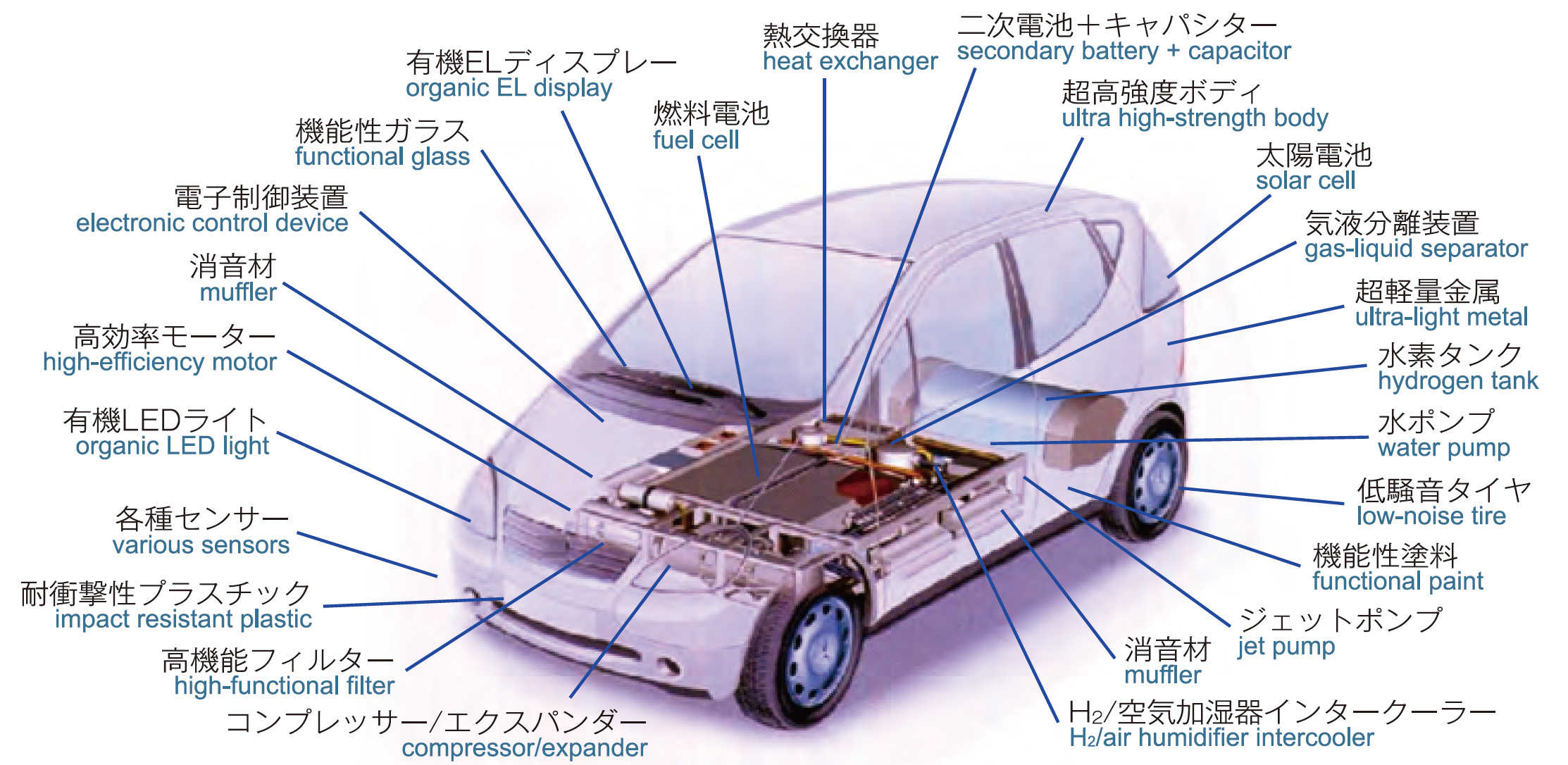
Solid oxide fuel cells
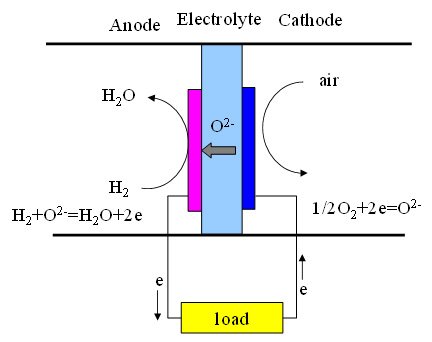
Development of new concept fuel cell are required for vehicle with high efficiency. New materials for solid oxide fuel cells are studied for decreasing operating temperature and increasing reliability. In particular, direct hydrocarbon type SOFC is mainly studied. On the other hand, metal-air battery is similar structure with fuel cells, and expecting as large capacity rechargeable battery. Highly active and reversible air electrode catalyst for Zn-air and Li-air battery is developing.
For wide use of diesel engines, removal of nitrogen oxide (NOx) and particulate matter (PM) is strongly required from environmental issues. Development of new de-NOx as well as low temperature PM oxidation catalyst is developing by using perovskite oxide. Application of catalytic technology for next generation automobile will be studied.
Polymer Nano-composites
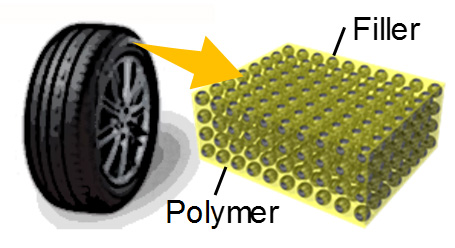
Our research object is to discover novel functionalities of organic polymeric materials by understanding and controlling structures and properties of the polymeric materials at the molecular level. Such research leads to the development of composite materials for interior parts and exterior parts of vehicles and tires. We conduct experiments in our laboratories, collaborate in research with a number of domestic and overseas companies, research institutions and universities, and if necessary we use large facilities for radiation and neutron experiments.
Advanced carbons for energy-saving and environmental protection
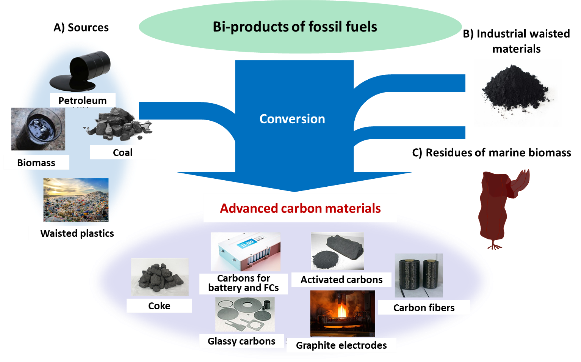
We are developing novel advanced carbon materials based on the deep recognition of hierarchical nanostructures for better utilization of fossil fuels and their bi-products. We are studying the carbon fibers for EVs and windmill, graphite electrodes, carbons for batteries and fuel cells, activated carbons and cokes for environmental protection with aiming at zero emission society with fully achieved green sustainable chemistry.
Semiconductor devices and Hydrogen related technology
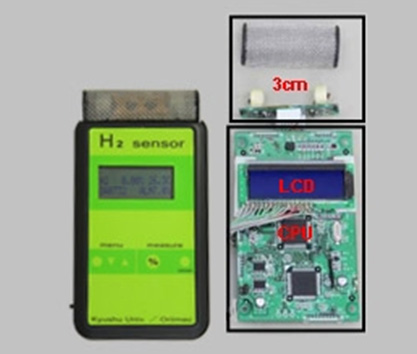
We are working on materials to stop the global warming and for renewable energy. For example, new solar cell fabrication process, new technology on hydrogen gas sensing using ultrasonic, hydrogen storage and generation, novel power device fabrication, application on phosphorescence material, etc. are studied. The picture is our new prototype hydrogen sensor using ultrasonic.
Adhesives and coating
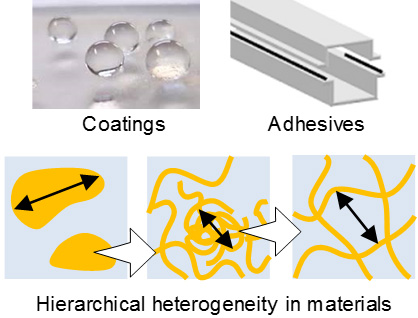
We conduct experiments related to organic functional materials including hydrogels, micelles, liquid crystals and colloids. One specific goal is the understanding of how local physical properties including their spatial heterogeneity are related to the macroscopic physical properties. Such approach should lead to the development of functional materials that is useful for the components in automobiles such as composites and adhesives. Another objective is the surface engineering for regulation of wettability and friction, which contribute to the coatings for automobiles, on the basis of a dynamic nature of organic (macro) molecules.
Functional nanomaterials based on organic-inorganic hybrid materials
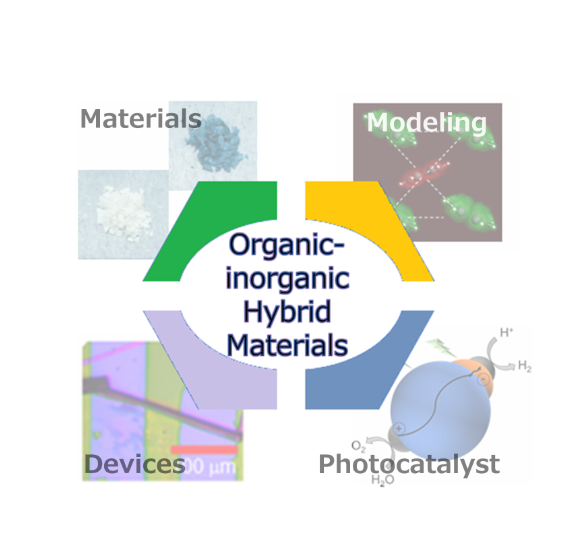
This laboratory developing new organic materials and conducting research on novel functional nanomaterials and organic devices.
We are conducting research with the goal of developing functional devices with unprecedented properties by drawing out the properties of organic materials and combining them with inorganic materials. For example, we are working on the development of organic materials for photocatalysts, optoelectronic devices, and organic transistors using organic-inorganic hybrids, and photocatalytic water-splitting production of hydrogen, which is expected to be a next-generation energy carrier.
Next-generation photon-electron conversion materials and devices

For establishment of the carbon-neutral society, utilization of renewable energy sources is necessary. Among them, we focus our attention on solar energy. We are developing new technologies for increasing efficiency, durability, and cell area, along with establishing basic science. Additionally, we are investigating new devices, which can efficiently convert electricity into light. Our research on photon-electron conversion materials and devices would contribute to automotive-related fields.
Student's Voice
Sugimoto ShinD2
- 1.What are the recommendation points in this field and fun research?
- Each student can do top-level research in a laboratory of own supervisor, professor. In many cases, students belonging to the other departments also join to the laboratory. Therefore, we have good opportunity to discuss with the students having the different backgrounds. Also, the class offered by the Advanced Material and Chemistry field covered a wide-ranged subjects which is not only related to my research area but also the other area. Learning a new thing brodened my horizons.
- 2.Message to juniors and examinees
- Seeing is better than hearing. I recommend you to have a look around the facilities.
Teaching Staff
| Faculty Members | Lab Location | Graduate Faculty | Education and Research Area |
|---|---|---|---|
| Prof. Tatsumi Ishihara | Ito Campus | Faculty of Engineering | Electrochemistry,Catalytic chemistry |
| Prof. Keiji Tanaka | Ito Campus | Faculty of Engineering | Polymer chemistry,Interfacial engineering |
| Prof.Yoon Seongho | Chikushi Campus | Institute for Materials Chemistry and Engineering | Materials engineering |
| Prof.Masamichi Nishihara | Ito Campus | International Research Center for Hydrogen Energy | polymer electrolyte, fuel cell, water electrolysis |
| Assoc. Prof. Yoshimine Kato | Ito Campus | Faculty of Engineering | Applied physics,Semiconductor optical properties/devices, Ultrasonic sensor |
| Assoc. Prof.Atsuomi Shundo | Ito Campus | Faculty of Engineering | Organic functional materials |
| Assoc. Prof. Motonori Watanabe | Ito Campus | International Institute for Carbon-Neutral Energy Research | Light energy conversion molecular devices |
| Assoc. Prof. Toshinori Matsusima | Ito Campus | International Institute for Carbon-Neutral Energy Research | Electronics materials/devices |
| Assoc. KAVEH EDALATI | Ito Campus | International Institute for Carbon-Neutral Energy Research | Materials physics and chemistry, functional nanomaterials |